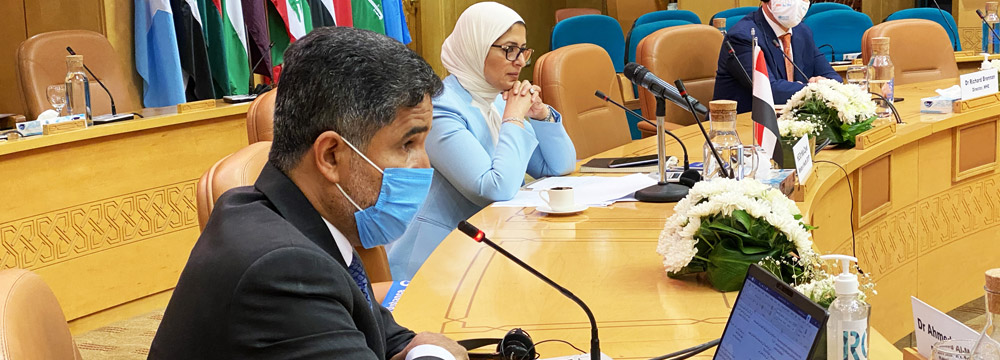
13 October 2020 - I am pleased at the outset to welcome Her Excellency Dr. Hala Zayed, Minister of Health and Population of Egypt, and to congratulate Her Excellency on her election as Chair of the 67th session of the Regional Committee for the Eastern Mediterranean.
The 67th session of the WHO Regional Committee for the Eastern Mediterranean has just concluded. The Regional Committee is WHO’s supreme governing body in the Eastern Mediterranean Region. This year’s session took place in extraordinary circumstances, as everyone knows. Like the rest of the world, our Region has been overwhelmed by the COVID-19 pandemic and the huge challenges of trying to control the pandemic and contain its severe health, social and economic impacts while also continuing to address other public health problems and issues.
The Regional Committee convened almost 9 months into the pandemic, with participation from ministers of health and high-level representatives from the 22 countries of the Eastern Mediterranean Region, partner organizations and the civil society. We also welcomed the contribution of WHO’s Director-General, Dr Tedros Adhanom Ghebreyesus.
This online meeting represented a significant and necessary chance for all of us to step back and review our approaches in dealing with COVID-19 pandemic, and to consider how to implement our regional strategy during the pandemic and beyond.
To date, more than 2.7 million confirmed cases of COVID-19 have been reported from all countries of the Region, with deaths exceeding 65 000. These numbers are rising at very alarming rates in several countries. Alongside the direct impact of mortality and morbidity from COVID-19, the pandemic is also having serious impacts on health services including immunization services, elective surgeries and treatment of chronic diseases as well as efforts to address other health emergencies and crises. It is no exaggeration to say that such impacts are more serious than the pandemic itself.
Over the past two days we have discussed at length many other issues affecting the health and well-being of our Region’s entire population. I was honoured to present the annual report on the work of WHO in the Region throughout 2019 and part of 2020, and the Committee also discussed a series of technical papers and reports.
Several draft resolutions have been proposed for the Regional Committee’s consideration, including:
A call for continued work, implementation and regular updating of Covid-19 national plans; ensuring accurately and timely reporting of data to WHO as per the International Health Regulations (IHR 2005); maintaining the national capacities required to early detect, test, isolate and treat cases, trace contacts and implement quarantine in case public health and social measures are suspended or re-enforced; securing safe water, hygiene and sanitation services; implementing measures of infection prevention and control (IPC); and preserving the functionality and strength of health systems to respond effectively to the pandemic and other outbreaks, especially during complex emergencies.
Establishing a new regional Subcommittee for Polio Eradication and Outbreaks to support the intensive efforts to eradicate this disease from the Region; provision of support to the remaining polio-endemic countries in the Region; and reporting annually to the Regional Committee, the Executive Board and the World Health Assembly on the current situation, progress and challenges until polio eradication is successfully certified regionally.
Establishing a procedure to grant accreditation to regional non-State actors not in official relationships with WHO so they can participate in future Regional Committee meetings, in line with the provisions of WHO’s framework of engagement with non-State actors (FENSA).
Adopting a new regional strategy to improve access to essential medicines and vaccines.
Adopting the annual report of the Regional Director for 2019 and endorsing the strategic framework of action to improve access to assistive technology in the Eastern Mediterranean Region, and the strategic framework for the prevention and control of emerging and epidemic-prone infectious diseases.
We have agreed and pledged that this is the right time to redouble efforts to address the COVID-19 pandemic and to build on these efforts in preparing for and responding to any epidemics or pandemics that may take place in the future.
We are determined to do so.
Today, we mark the International Day for Disaster Risk Reduction. We must not forget that our Region is vulnerable to natural disasters that have a severe impact on people, communities, countries and health systems. In the past few months, Somalia, Sudan and Pakistan were hit by floods. This week alone, forest fires erupted along the Syrian coast, injuring dozens and forcing 100 000 people from their homes.
The impact of disasters, particularly in terms of mortality, injuries and displacement, can be reduced through good management of disaster risks. These issues came under the spotlight this year when countries found themselves ill prepared to manage global threats such as COVID-19 pandemic.
Through collaboration with the United Nations Office for Disaster Risk Reduction (UNDRR), the Regional Office co-developed with countries a draft regional framework of action to operationalize the implementation of the Sendai Framework for Disaster Risk Reduction 2015‒2030. The draft framework identifies clear actions that countries, communities individuals and institutions can take in order to improve means to minimize the current risks and avoid novel risks through strengthening the capacity of individuals, communities, countries and systems to better predict, control and recover from current and new disasters.
In closing, I assure you that we are committed to promoting the health and well-being of people across the Region.








